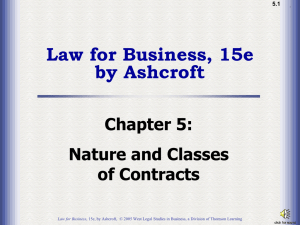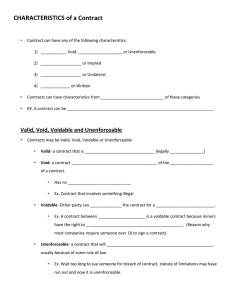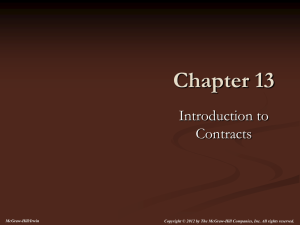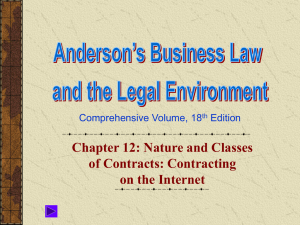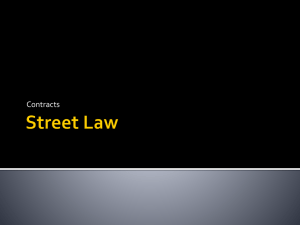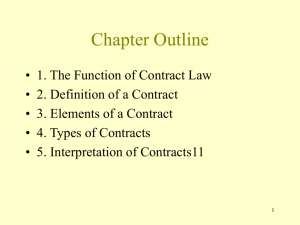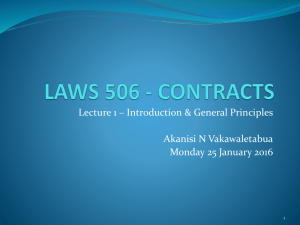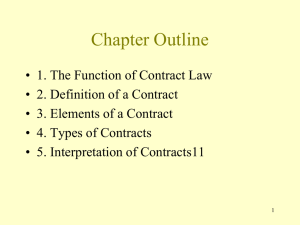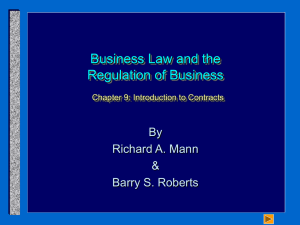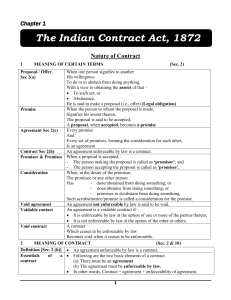Parties to a Contract
advertisement
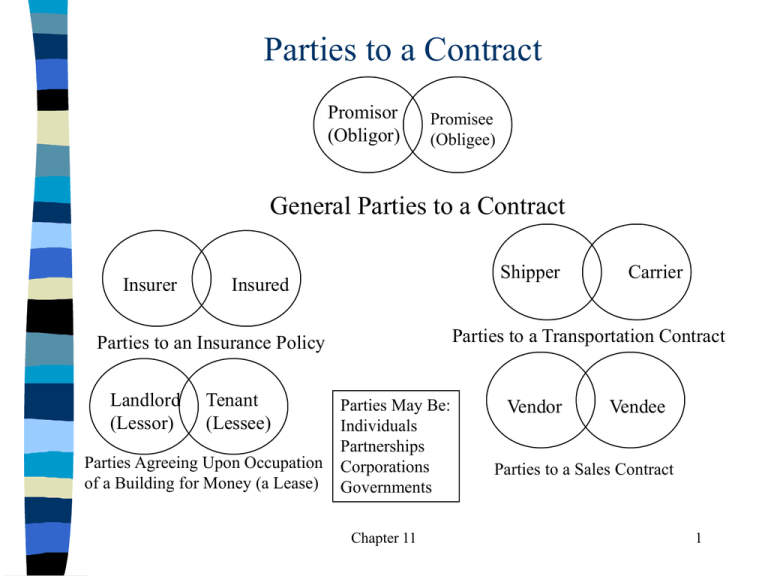
Parties to a Contract Promisor (Obligor) Promisee (Obligee) General Parties to a Contract Insurer Shipper Insured Parties to a Transportation Contract Parties to an Insurance Policy Landlord (Lessor) Tenant (Lessee) Parties Agreeing Upon Occupation of a Building for Money (a Lease) Carrier Parties May Be: Individuals Partnerships Corporations Governments Chapter 11 Vendor Vendee Parties to a Sales Contract 1 Classes of Contracts INFORMAL FORMAL contract under seal, contracts of record, negotiable instruments all other contracts IMPLIED EXPRESS spoken or written words VALID binding and enforceable created by law based on acts or conduct of parties VOIDABLE circumstances surrounding execution or lack of capacity allows rejection at option of one party EXECUTED completely performed BILATERAL one promise given in exchange for another VOID without legal effect EXECUTOR Y remains to be done something UNILATERAL only one party is obligated to perform after contract formation Chapter 11 VOID gives a right to one party to enter into a second contract at a later date 2 Types of Contracts Express Implied Written or orally stated No express agreement services rendered Valid In compliance with the laws of formation and subject matter Voidable Execution or capacity issues in formation Void Illegal subject matter incapacity (declared insane) of a party Executed Promises performed Executory Contract negotiated and signed but not performed Bilateral Promise for a promise Unilateral Promise for a performance Option Separate contract to have a offer held open Quasi Contract Right to recovery under implied contract to prevent unjust enrichment Chapter 11 3 Contractual Liability Intent Intent Offer Acceptance Communication Communication Unjust Enrichment No Contract Avoided Contract Void Agreement Quasi Contract Contract Express Formal Executory Bilateral Implied Informal Executed Unilateral Option First Refusal Chapter 11 4 Contract Parties This contract is executed between the Lookout Alarm system, herein called System, of 276 West Jackson Street, Phoenix, Arizona, and A.J. Armstrong, herein called Homeowner, of 737 Inwood Drive, Phoenix, Arizona Installation System agrees to install a burglar alarm system at the above address of the homeowner, in accordance with the specifications that are attached hereto. Payment Homeowner agrees to pay System for the above installation the sum of $4,863.00, $663.00 being paid upon execution of this contract and the balance of $4,200.00 being paid within 90 days following satisfactory completion of the work by System. } } } 4 A.J. Armstrong Lookout Alarm System by S.J. McRory A.J. Armstrong S.J. McRory, President July 1, 2001 July 1, 2001 Date Date Chapter 11 5 5 1 2 3 Chapter 11 Summary A contract is a binding agreement between two or more parties. A contract arises when an offer is accepted with contractual intent (the intent to make a binding agreement). Chapter 11 6 Chapter 11 Summary (cont.) Contracts may be classified in a number of ways according to form, the way in which they were created, validity, and obligations. With respect to form, a contract may be either informal or formal, such as those under seal or those appearing on the records of courts or administrative agencies. Chapter 11 7 Chapter 11 Summary (cont.) Contracts may be classified by the way they were created as those that are expressed by words—written or oral—and those that are implied or deduced from conduct. The question of validity requires distinguishing between contracts that are valid; those that are voidable; and those that are not contracts at all but are merely void agreements. Chapter 11 8 Chapter 11 Summary (cont.) Contracts can be distinguished on the basis of the obligations created as executed contracts, in which everything has been performed, and executory contracts, in which something remains to be done. The bilateral contract is formed by exchanging a promise for a promise, so each party has the obligation of thereafter rendering the promised performance. Chapter 11 9 Chapter 11 Summary (cont.) In the unilateral contract, which is the doing of an act in exchange for a promise, no further performance is required of the offeree who performed the act. The only obligation is that of the promisor. Chapter 11 10 Chapter 11 Summary (cont.) In certain situations, the law regards it as unjust for a person to receive a benefit and not pay for it. In such a case, the law of quasi contracts allows the performing person to recover the reasonable value of the benefit conferred on the benefited person even though no contract between them requires any payment. Chapter 11 11 Chapter 11 Summary (cont.) Unjust enrichment, which a quasi contract is designed to prevent, sometimes arises when there was never any contract between the persons involved or when there was a contract, but for some reason it was avoided or held to be merely a void agreement. Quasicontractual recovery is not allowed merely because someone loses money. Chapter 11 12
